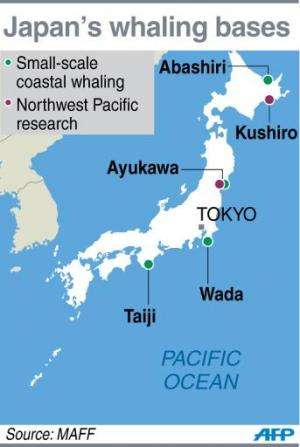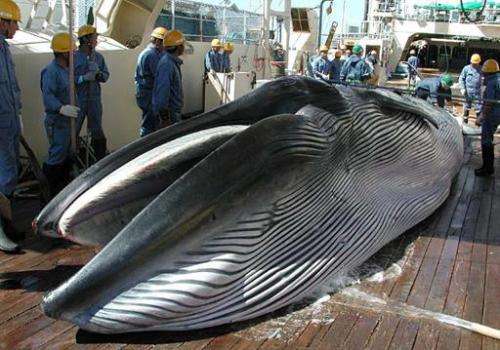Japan PM vows efforts to resume commercial whale hunt

Japan's prime minister told parliament Monday he would boost his efforts toward restarting commercial whaling, despite a top UN court's order that Tokyo must stop killing whales in the Antarctic.
Shinzo Abe's comments put him firmly on a collision course with anti-whaling groups, who had hoped the ruling by the International Court of Justice (ICJ) would herald the beginning of the end for the mammal hunt.
"I want to aim for the resumption of commercial whaling by conducting whaling research in order to obtain scientific data indispensable for the management of whale resources," Abe told a parliamentary commission.
"To that end, I will step up efforts further to get understanding from the international community," he said.
Abe said that in contrast to the foreign perception that whaling communities mercilessly exploit the giant mammals, whaling towns appreciate the meat and show respect to the creatures with religious services at the end of every hunting season.
"It it regrettable that this part of Japanese culture is not understood," Abe said.
Japan has hunted whales under a loophole in the 1986 global moratorium, which allows lethal research on the mammals, but it has made no secret of the fact that their meat ends up in restaurants and on fish markets.

The annual hunt in the Southern Ocean has proved particularly controversial, with sometimes violent confrontations between whalers and protestors.
Australia, backed by New Zealand, hauled Japan before the ICJ in 2010 in a bid to stop the yearly campaign.
The court slammed the hunt, which it said was a commercial venture masquerading as research.
Tokyo called off its 2014-15 Antarctic season, and said it would redesign the mission in a bid to make it more scientific.
A separate hunt in the northwest Pacific continues, as do hunts in coastal waters which are not covered by the moratorium.
Since the ICJ ruling, Japanese e-commerce marketplace Rakuten has told online retailers they cannot sell whale and dolphin meat through its site.
But dealing in whale meat "does not violate international or domestic laws in any way", said Agriculture, Forestry and Fisheries Minister Yoshimasa Hayashi.

Hayashi told the same parliamentary committee that Rakuten had made a commercial decision as a private company, but that the increasing number of companies that are refusing to sell whale meat is "regrettable".
Inviting people to dine on whale in his ministry, he said a "whale week" campaign, which began Monday, was part of efforts to let Japanese people know that whaling and eating whale meat are part of their culture.
Whales were once a key source of fuel and food, but Japan's consumption of the meat has considerably diminished in recent decades and it is no longer a regular part of most people's diet.
However, powerful lobbying forces have ensured the continued subsidisation of the hunt with taxpayer money.
Tokyo has always maintained it was trying to prove whale populations were big enough to sustain commercial hunts.
© 2014 AFP




















